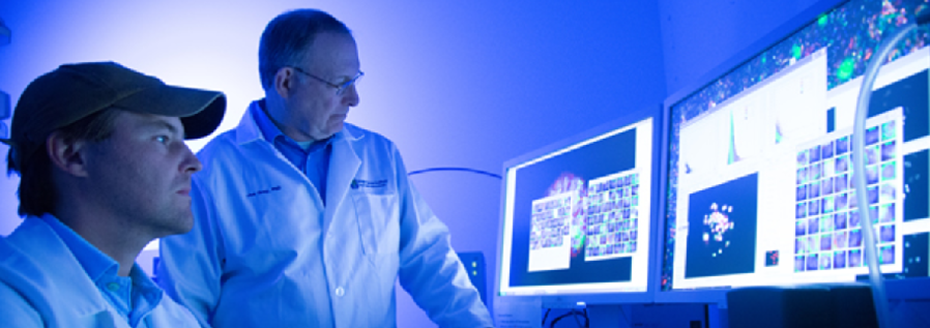Quantitative Oncology Research

Understanding tumor behavior to improve outcomes for cancer patients
Quantitative Oncology (QO) is a multi-disciplinary research program developing advanced measurement capabilities and computational techniques to improve outcomes for patients with cancer. We are seeking a quantitative understanding of the behavior of cancerous cells and tissues as they evolve, respond to therapy, and interact with their microenvironments.
Research Themes
- Technology Development: Investigators in this theme focus on tumor measurement technologies, including imaging, sequencing technologies, and device development. The imaging sub-theme includes instrumentation (e.g. cutting edge microscopes), approaches to improve the multi-spectral capabilities of these microscopes, and the creation of new dyes, staining methods and chemical probes to enhance imaging capabilities even further. New capabilities in sequencing and devices include the development of novel single-cell sequencing technologies and improvements in collecting and/or assaying biomaterials and delivery of therapeutic agents. The use of these technologies is often designed to generate data in support of computational efforts in the Theme 3–Systems Biology, or to support new clinical applications to improve diagnosis and intervention.
- Omics & Characterization: Investigators in this theme focus on comprehensive characterization of cells and tissues. The theme uses sequencing, proteomic, and imaging data to assess the status of genomes, transcriptomes, epigenomes and proteomes, and the cellular organization of tumors. The overall goal is to use these data to understand the molecular basis of cancer, and to better treat cancer by identifying new therapeutic targets or developing strategies to deploy existing therapies more effectively. These approaches apply the new technologies developed in Theme 1–Technology Development and generate data used in Theme 3–Systems Biology.
- Systems Biology: This theme comprises investigators who use integrated approaches to understand cancer as a complex, adaptive system. This involves using tightly integrated experimental and computational techniques to predict the molecular and phenotypic responses of cancers under new interventional states by evaluating predictions with new measurements. Our members are part of the NCI Cancer Systems Biology Consortium; work in this theme also includes large-scale pathway annotation efforts such as Pathway Commons and Reactome. This theme draws on accomplishments in the other two themes by leveraging new technologies and ‘omic approaches developed in current or previous cycles.
Program Leaders
Program Members
-
- Fergus Coakley, M.B. B.Ch
- Body Imaging Radiologist
-
- Alexander Guimaraes, M.D., Ph.D., FACR
- Body Imaging Radiologist
-
- Noah Hornick, M.D., Ph.D. (he/him)
- Assistant Professor of Dermatology
-
- David Huang, M.D., Ph.D.
- Wold Family Chair in Ophthalmalogic Imaging
- Center for Ophthalmic Optics & Lasers
-
- Stefanie Kaech Petrie, Ph.D.
- Director, Advanced Light Microscopy Core at The Jungers Center
- Advanced Light Microscopy Core at The Jungers Center
-
- Nadine Mallak, M.D. (she/her)
- Nuclear Medicine and Body Radiologist
-
- Reid F. Thompson, M.D., Ph.D. (he/him)
- Radiation Oncologist